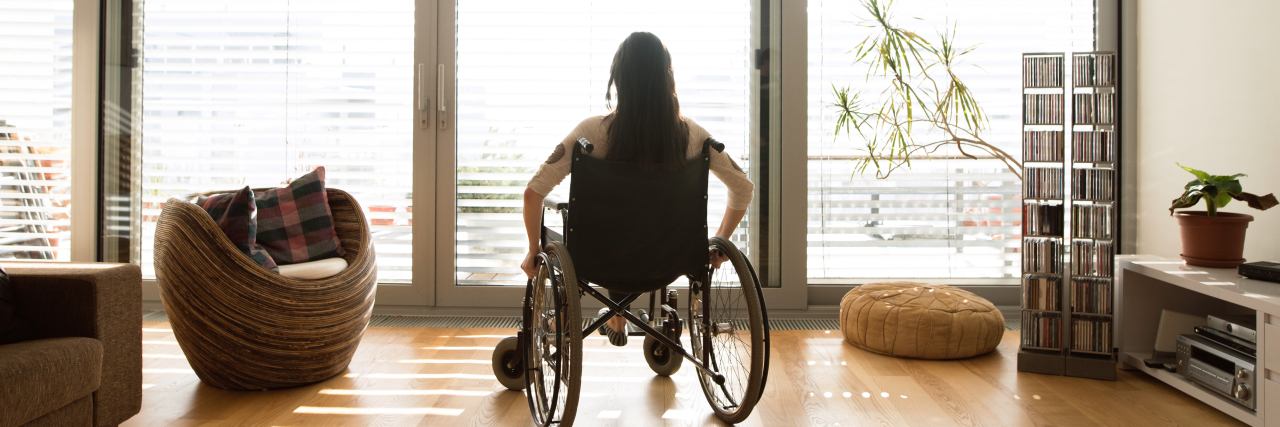Why I've Stopped Wondering What Others 'See' When They Look at Me
I often wonder, “What do people see when they look at me?”
I don’t “look” like I have a disability. There is no sign upon me that announces I have both mental and physical disabilities.
Many a person knows the saying “never judge a book by its cover,” yet that’s exactly what happens all the time.
When other people look at me, they don’t see the pain in my ligaments, joints, muscles, head and skin.
They don’t see the exhaustion caused just by waking up, moving, or even breathing at times.
Nor the two hours it takes me after I wake to be able to move because the weakness, pain, lethargy, fatigue all take their toll on me.
People don’t see that my body gives me no choice but to sleep a minimum of 12 hours daily, sometimes even up to 18 or 20. They don’t see the pressure points caused from laying down or sitting all the time.
They don’t see me losing my balance, crashing into furniture and doors when I’m unaided. They don’t see I can’t even prepare a bowl of cereal or bathe myself. They don’t see that I struggle with stairs to the point of it being dangerous.
They have no idea how hard it is needing another person to dress me, to need to have all my needs met by another human, because without that intervention, I would likely not be alive.
They don’t see the impact on my mental health from having a disease so rare that it means not a single consultant in the UK is willing to take me on as a patient, so I am constantly fighting with the NHS over lidocaine pain infusions.
I do not wear a hat with a list of my medications that may give away how much I suffer. I don’t wear my Fentanyl patch for all to see, or swig my Oramorph like pop out in public.
What is it people see when they look at me? Not the tingling, cold, hot, burning, stabbing, thumping, numbness that flows beneath my skin.
Not the lead-weighted body that I literally cannot move, with feet that feel like concrete, and clothing nailed to the bed. I know I’m alive, but I feel dead sometimes.
I’ve been on the receiving end of others’ ignorance and rudeness, listening to their quips, hearing them say “it’s all in my head,” and deciding to leave me behind. It rips me to bits.
I always wondered what crossed their minds. What do people see when they look at me? This used to be an important question.
Sometimes I feel embarrassed about being disabled, as I’m only 45. I’m embarrassed I need a wheelchair, stair lift, and ramps fitted to my house because I take on other people’s perceptions of me and try to fit in that square.
When I’m not feeling fragile and my resilience kicks in, I look at the judges and a smile creeps on my face. I realize now that I don’t care for what they have to say.
I know my own body; I live in this skin. I own the head attached to it all. So what do you see when you look at me? A disabled woman? A liar? A woman that’s a-OK?
I’ve almost come to the point of accepting all of me. I’ve stopped judging myself. I’m not the failure I thought I was. I’m not a weight upon my family being dragged along. I’m not an inconvenience. I’m not useless.
Accepting this failing body of mine is an ongoing process, a process that changes the more ill I get and the more my cognition fails me. Still, I’ve learned not to give up. I’ve also chosen not to fight it all, because fighting is tiring.
So I know what I see when I look at myself. As for the judgment of others, I’ve learned not to care much. I do care some, and I would like those who judge me and others who are chronically ill to see past their misconceptions, for my body tells lies to those not looking in.
I’m not other people’s judgments. That’s their load to carry, their own mirror to their face, their personal internal gremlins.
What I’ve learned is I’m not here to prove myself to people I don’t know, care about, or interact with. I have the ability to choose whose opinions will affect me. For everyone else, if they don’t mean anything to me, then neither do their negative comments.
Do you ever wonder what people think when they look at you?
Here’s my advice: don’t –it’s draining. You are enough.

